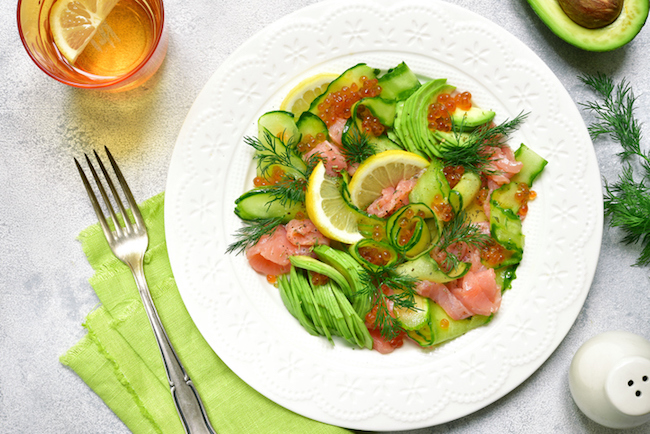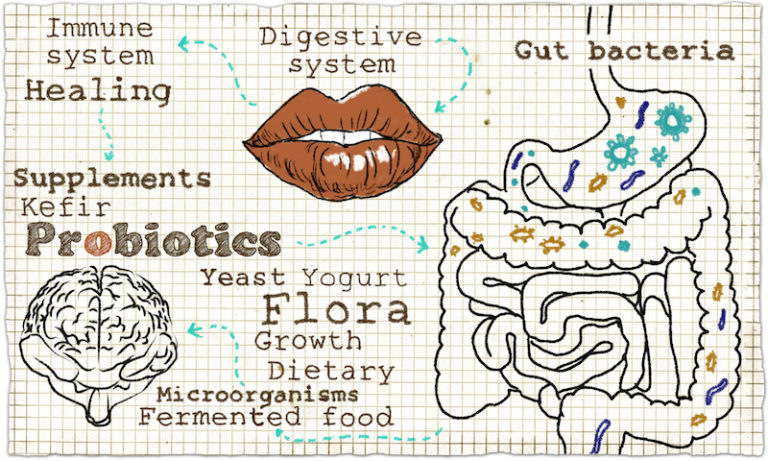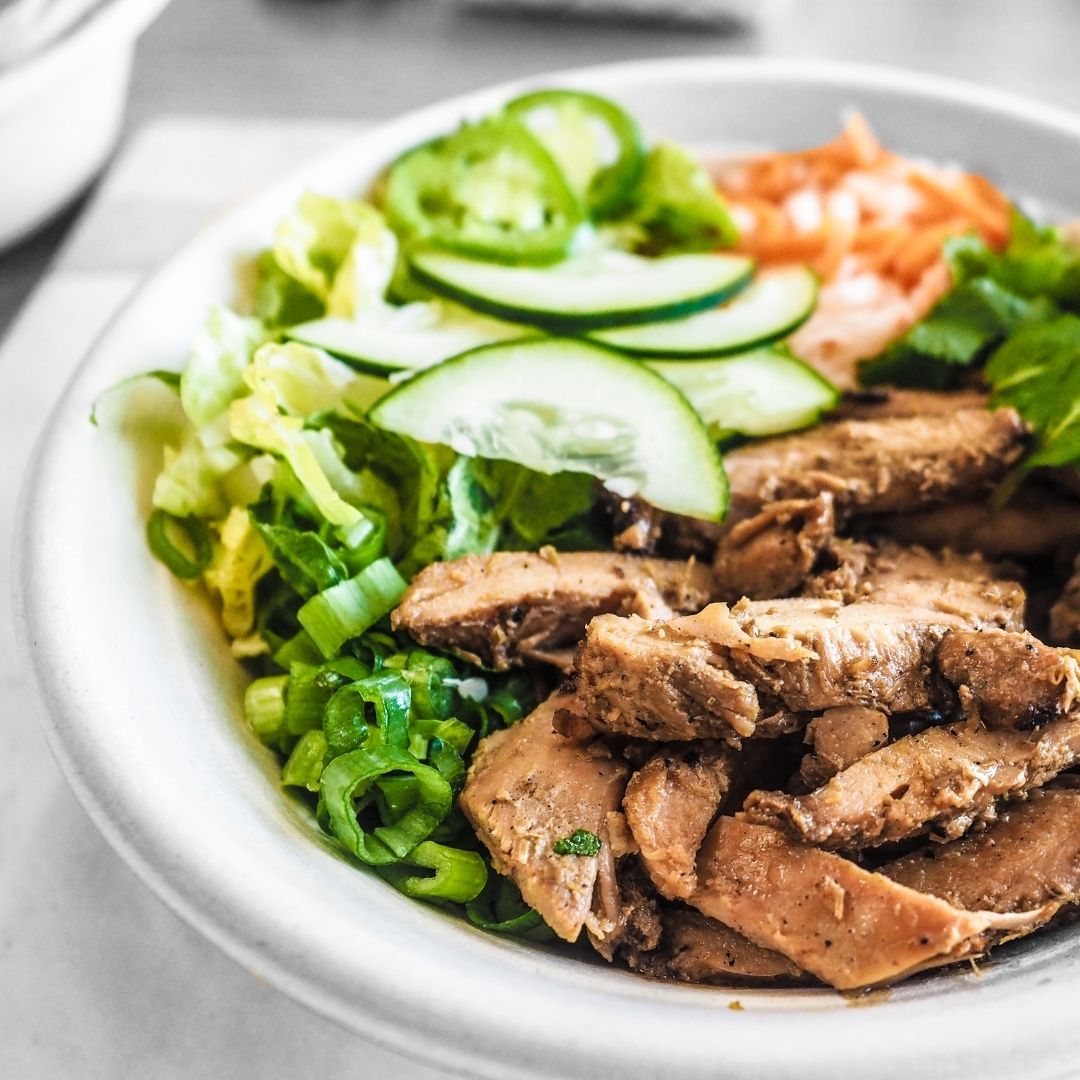Processed foods, pesticides, medications, and toxins damage the gut microbiome which in turn drives a range of digestive, autoimmune and neurological illness. Various “Healing diets” work to heal the gut and calm the immune system and vary depending on the gut, genetics and environment.
The Autoimmune Paleo Diet (AIP)
The Autoimmune Paleo (AIP) diet is derived from the Paleolithic diet.
The Paleolithic diet, known today as the modern Paleo diet, originated from the ideas of a gastroenterologist in 1975, Dr. Walter Voegtlin. Later in 1985, Dr. Boyd Eaton wrote a scientific paper about Paleolithic nutrition, published in the New England Journal of Medicine. However, the diet has been made popular by Dr. Loren Cordain, founder of the Paleo Movement, in 2002.

Vegetable salad with salmon and red caviar on a white plate on a light slate,stone or concrete background.Top view.
Gut Inflammation Relief
The AIP diet is an elimination and reintroduction protocol which aims to reduce inflammation in the gut, heal the gastrointestinal tract and in turn, reduce overall systemic inflammation. It is a diet targeted specifically at autoimmune diseases.
Traits of the AIP Diet
The AIP diet focuses on removing foods from the diet that people are commonly sensitive to, in order to lower overall inflammation.
The AIP diet is a version of the original Paleo diet which addresses underlying inflammation stemming from the gut, and can be a major driver of autoimmune disease. The AIP diet aims to bring the gut microbiota back into balance, whilst optimizing overall nutrient intake.
Beyond the Traditional Paleo Diet for Autoimmune Conditions
The traditional Paleo diet eliminates all grains and processed foods. It focuses on whole, nutrient-dense foods, such as fruit and vegetables, organic meats, eggs, and wild-caught fish. However, this is often not comprehensive enough for chronic autoimmune diseases, as not enough of the immune triggers are removed.
Because the AIP diet is utilized specifically for autoimmune diseases, it is almost always necessary to employ additional modalities to treat the condition. Herbal and nutritional medicines may be prescribed alongside an autoimmune diet as a part of a protocol to treat you as a whole person, rather than just targeting the disease process in isolation.
Not everyone must strictly avoid all the eliminated foods from the diet permanently, as not everyone with an autoimmune disease is sensitive to these foods.
The Gut and Immunity
There is a complex symbiotic relationship between the immune system of the host (person) and the gut microbiota.
The microbiota is the population of the microbes which reside in the gut. It carries out digestion and fermentation of carbohydrates, synthesizes certain vitamins, provides development of the gut-associated lymphoid tissue (GALT), and also prevents the colonization of pathogens. The host will provide nutrients for the survival of the bacteria.

Your Microbiota and Your Microbiome
Let’s take a quick look at these increasingly common terms…
The human microbiota comprises the populations of microbial species that live on or in the human body – the bacteria, viruses and fungi that call our bodies home.
It is estimated that each of us has anywhere between 10 trillion and 100 trillion microbial cells in a symbiotic relationship. These make up the human microbiota.
All of the genes inside these microbial cells, meanwhile, are what constitute the microbiome.
Watch this video to understand more about your body’s ecosystem (produced by the Genetic Science Learning Center)
Disturbance of the Gut Microbiome
When there is disturbance to this symbiotic relationship due to poor dietary or lifestyle choices, medications such as antibiotics, and/or stress, the microbiota could potentially contribute towards the development of certain infectious disease or trigger an autoimmune process.
The AIP diet has a strong emphasis on reducing inflammation in the gut as the digestive system plays a major role in the overall function of the immune system. Eliminating foods that reduce inflammation is important, as foods which irritate the gut can potentially exacerbate autoimmunity.
What conditions may benefit from the AIP diet?
Many autoimmune conditions may benefit from the AIP diet, including:
- Hashimoto’s Disease
- Rheumatoid Arthritis
- Coeliac Disease
- Adrenal fatigue
- Recurrent viral infections or low immunity
- Poly Cystic Ovarian Syndrome (PCOS)
- Multiple Sclerosis
- Sjogren’s
- Type 1 Diabetes
- Lupus (SLE)
Other factors to consider with the AIP
As autoimmune conditions can potentially be very complex, there are many other factors that need to be taken into consideration in addition to addressing diet when dealing with conditions like the aforementioned.
Hormonal imbalances, and the hypothalamic-pituitary-adrenal/ovarian axis need to be assessed and addressed. Potential infections, either acute or chronic also need to be dealt with. Digestive bacterial imbalances, such as Small Intestinal Bacterial Overgrowth (SIBO), or even parasitic infections, should be rectified. Blood sugar issues such as insulin resistance, or pre-diabetes need to also be identified.
Other factors such as your sensitivity to high FODMAPs foods (fermentable oligosaccharides, disaccharides, monosaccharides and polyols), and your tolerance to histamines and salicylates needs to be assessed individually in order to tailor an autoimmune protocol that is suitable for you.
There may also be specific testing that needs to be conducted in order to monitor disease progression or improvement whilst endeavoring to treat autoimmune diseases. These may include, but are not limited to inflammatory markers, specific hormones, blood glucose testing, imaging scans, and specimen cultures.
What can be eaten and what is excluded with AIP?
The table below outlines what should be eaten and excluded during the elimination phase of the AIP diet:
Included with AIP | Excluded from AIP |
|
|
High FODMAPs food such as fruit (onion, coconut, nectarines) may bother some people and these need to be eliminated during the first phase. Re-introduction of high FODMAPs foods should be done with care, you can read more about how to reintroduce these foods
How to implement the AIP diet:
It is recommended to follow the elimination diet for at least 30 days, and up to 90 days. Beginning the elimination phase can be done cold turkey, or one category of food can be removed at a time, for a week. E.g. Grains are removed the first week, followed by dairy products the second week, nightshades the third week, eggs the fourth week and so on.
When positive change is observed, the reintroduction phase is commenced. This needs to be done slowly and systematically, to reduce the chances of a reaction. Reactions may not always occur immediately, there may be slow increases of symptoms that may not be noticed as easily.
Choose a food group that is important to you, and start with that group. If dairy is chosen, choose a food like ghee with a low amount of milk proteins, followed by butter, cream, yoghurt, cheese and milk.
Eggs should be reintroduced with yolks only first. Nightshades should be reintroduced individually (potatoes, tomatoes, eggplants).
Only introduce one food at a time and allow for three full days between foods to observe any potential reactions to that food before moving on to the next. If a food has been eaten for three days without any autoimmune symptoms, it can be assumed that that food is safe for you.
One day on the AIP Diet:
Below are examples of meals that you could eat on the AIP diet:
Breakfast | Lunch | Dinner | Snacks |
|
|
|
|
References:
Arrieta MC, Bistritz L, Meddings JB, 2006, ‘Alterations in intestinal permeability’, Gut, 55(10), 1512-1520
De Oliveira GLV, Leite AZ, Higuchi BS, Gonzaga MI, Mariano VS, 2017, ‘Intestinal dysbiosis and probiotic applications in autoimmune diseases’, Immunology.
Gomez A, Luckey D, Taneja V, 2015, ‘The gut microbiome in autoimmunity: sex matters’, Clin Immunol, 159(2), 154-156
Mann ER, Bernardo D et al, 2016, ‘Compartment-specific immunity in the human gut: properties and functions of dendritic cells in the colon versus the ileum’, Gut, 65(2), 256-270
Marchesi JR, Adams DH, 2016, ‘The gut microbiota and host health: a new clinical frontier’, Gut, 65(2), 330-339
Sutherland DB, Fagarasan S, 2012, ‘IgA synthesis: a form of functional immune adaptation extending beyond the gut’, Curr Opin Immunol, 24(3), 261-8
Diet Profile Research and Writing: Kimberly Kushner BHSc (Nutritional Medicine), BHSc (Naturopathy) for MINDD



